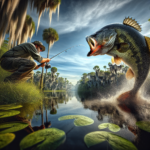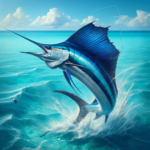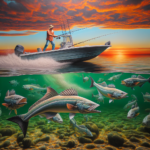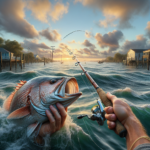King Mackerel Fishing in Florida’s Atlantic Coast
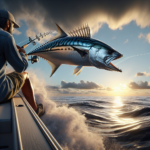
Introduction
Did you know that the King Mackerel, also known as the “Kingfish,” can reach speeds of up to 40 miles per hour? This makes them one of the most exhilarating catches for anglers along Florida’s Atlantic Coast. In this article, we will delve into the intricacies of King Mackerel fishing in this region, covering everything from the best fishing techniques and gear to the top fishing spots and seasonal considerations. Whether you’re a seasoned angler or a novice looking to catch your first King Mackerel, this guide has something for you.
Understanding the nuances of King Mackerel fishing is crucial for anyone looking to make the most of their fishing trips along Florida’s Atlantic Coast. This article aims to provide comprehensive insights into the species, the best fishing techniques, and the optimal times and locations for a successful catch.
Background/Context
Historical or Cultural Significance
King Mackerel fishing has a rich history in Florida, dating back to the early 20th century when commercial and recreational fishing began to flourish. The species has long been a staple in local diets and a prized catch for sport fishermen. Over the years, King Mackerel tournaments have become popular events, drawing anglers from all over the country to Florida’s Atlantic Coast.
Geographical Overview
Florida’s Atlantic Coast stretches from the Georgia border down to the Florida Keys, encompassing a diverse range of ecosystems, from estuaries and mangroves to coral reefs and open ocean. The region’s warm climate and nutrient-rich waters create an ideal habitat for King Mackerel, which are often found in coastal waters, around reefs, and near offshore structures.
Key Points/Details
Fishing Techniques
Technique Overview
Several techniques are effective for catching King Mackerel, including trolling, live bait fishing, and casting. Trolling involves dragging lures or bait behind a moving boat, while live bait fishing uses live fish to attract King Mackerel. Casting involves throwing lures or bait into the water and retrieving them to mimic the movement of prey.
When and Where to Use
Trolling is particularly effective in open waters and around offshore structures, such as shipwrecks and reefs. Live bait fishing is best near coastal areas and around reefs, where King Mackerel are likely to hunt. Casting can be effective from piers, jetties, and boats, especially when targeting schools of King Mackerel.
Recommended Gear
- Rods: Medium to heavy-action rods, around 7-8 feet in length.
- Reels: High-speed spinning or conventional reels with a strong drag system.
- Lines: Braided line (30-50 lb test) for strength and sensitivity.
- Bait/Lures: Live bait such as menhaden, mullet, or blue runners; lures like spoons, jigs, and diving plugs.
Species Information
Species Overview
King Mackerel (Scomberomorus cavalla) are fast, predatory fish known for their sharp teeth and streamlined bodies. They prefer warm, coastal waters and are often found near reefs, shipwrecks, and other underwater structures. King Mackerel are migratory, moving north in the summer and south in the winter.
Best Practices
To successfully catch King Mackerel, use live bait or lures that mimic their natural prey. Trolling at speeds of 5-7 knots is effective, as is live bait fishing near reefs and structures. Pay attention to water temperature and currents, as King Mackerel are more active in warmer waters.
Location Information
Top Fishing Spots
- Daytona Beach: Known for its piers and offshore reefs, offering excellent King Mackerel fishing opportunities.
- St. Augustine: Features numerous inlets and offshore structures that attract King Mackerel.
- Fort Pierce: Offers access to deep waters and reefs, ideal for trolling and live bait fishing.
- Miami: Known for its vibrant fishing community and access to both inshore and offshore fishing spots.
Regulations and Licenses
Florida requires a saltwater fishing license for all anglers. Regulations for King Mackerel include a minimum size limit of 24 inches fork length and a daily bag limit of two fish per person. Be sure to check the Florida Fish and Wildlife Conservation Commission (FWC) website for the most up-to-date regulations.
Seasonal Considerations
Seasonal Variations
King Mackerel fishing is best during the spring and fall when the fish migrate along the coast. Summer can also be productive, especially in northern areas, while winter fishing is better in southern regions like the Florida Keys.
Best Times to Fish
The optimal times for King Mackerel fishing are early morning and late afternoon when the fish are most active. Tides and moon phases can also influence feeding behavior, so plan your trips around these factors for the best results.
Events and Tournaments
Event Overview
Florida hosts several King Mackerel tournaments throughout the year, including the SKA (Southern Kingfish Association) tournaments and local events like the Fort Pierce Kingfish Tournament. These events offer cash prizes and attract anglers from all over the country.
Preparation Tips
To prepare for a tournament, practice your fishing techniques and familiarize yourself with the tournament rules. Ensure your gear is in top condition and consider pre-fishing the tournament area to identify productive spots. Networking with other anglers can also provide valuable insights.
Tips and Best Practices
General Tips
- Use a wire leader to prevent King Mackerel from cutting your line with their sharp teeth.
- Keep your bait or lures moving to mimic the natural behavior of prey.
- Pay attention to bird activity, as diving birds often indicate the presence of baitfish and predatory fish like King Mackerel.
Avoid Common Mistakes
- Using the wrong gear: Ensure you have the appropriate rods, reels, and lines for King Mackerel fishing.
- Ignoring water conditions: Pay attention to water temperature, currents, and tides, as these factors influence fish behavior.
- Fishing in the wrong areas: Focus on areas with structure, such as reefs and shipwrecks, where King Mackerel are likely to hunt.
Advanced Techniques
- Slow trolling: Use downriggers to troll baits at different depths, increasing your chances of finding fish.
- Chumming: Create a chum slick to attract King Mackerel to your fishing area.
- Vertical jigging: Use heavy jigs to target King Mackerel near the bottom, especially around structures.
Gear and Equipment Recommendations
Essential Gear
- Medium to heavy-action rods (7-8 feet)
- High-speed spinning or conventional reels
- Braided line (30-50 lb test)
- Wire leaders
- Live bait (menhaden, mullet, blue runners)
- Lures (spoons, jigs, diving plugs)
Optional Gear/Upgrades
- Downriggers for trolling at different depths
- Chum buckets for creating a chum slick
- Fish finders to locate schools of King Mackerel
Where to Buy or Rent
Local tackle shops along Florida’s Atlantic Coast offer a wide range of fishing gear and equipment. Some popular options include Bass Pro Shops, West Marine, and local bait and tackle stores. Online retailers like Amazon and TackleDirect also provide a variety of options for purchasing gear.
Safety and Conservation
Safety Tips
- Always check the weather forecast before heading out, as conditions can change rapidly.
- Wear a life jacket and ensure your boat is equipped with safety gear, including flares, a first aid kit, and a VHF radio.
- Be cautious of wildlife hazards, such as jellyfish and sharks, especially when handling bait or fish.
Conservation Practices
- Practice catch and release to help maintain healthy fish populations.
- Follow local fishing regulations and respect size and bag limits.
- Avoid damaging reefs and other underwater structures, as they provide essential habitat for marine life.
Planning Your Trip
Accommodations
There are numerous accommodation options along Florida’s Atlantic Coast, ranging from budget-friendly motels to luxury resorts. Some popular choices include:
- Daytona Beach: Hilton Daytona Beach Oceanfront Resort, Best Western Aku Tiki Inn
- St. Augustine: Casa Monica Resort & Spa, Hampton Inn St. Augustine Beach
- Fort Pierce: Hutchinson Island Plaza Hotel & Suites, Dockside Inn & Resort
- Miami: Fontainebleau Miami Beach, The Ritz-Carlton Key Biscayne
Travel Tips
- Florida’s Atlantic Coast is easily accessible by car via Interstate 95.
- Major airports include Jacksonville International Airport (JAX), Orlando International Airport (MCO), and Miami International Airport (MIA).
- Consider renting a car for flexibility in exploring different fishing spots.
Additional Activities
In addition to fishing, Florida’s Atlantic Coast offers a variety of activities for non-fishing time, including:
- Beachcombing and swimming
- Visiting historical sites like the Castillo de San Marcos in St. Augustine
- Exploring nature reserves and parks, such as the Merritt Island National Wildlife Refuge
- Enjoying water sports like kayaking, paddleboarding, and snorkeling
Frequently Asked Questions (FAQs)
What is the best time of year to fish for King Mackerel in Florida?
The best times are during the spring and fall migrations. Summer is also productive in northern areas, while winter is better in southern regions like the Florida Keys.
Do I need a special license to fish for King Mackerel?
Yes, a saltwater fishing license is required in Florida. Check the FWC website for specific regulations and requirements.
What is the minimum size limit for King Mackerel?
The minimum size limit is 24 inches fork length, with a daily bag limit of two fish per person.
What gear do I need for King Mackerel fishing?
Essential gear includes medium to heavy-action rods, high-speed reels, braided line (30-50 lb test), wire leaders, live bait, and lures like spoons and jigs.
Conclusion
King Mackerel fishing along Florida’s Atlantic Coast offers an exciting and rewarding experience for anglers of all skill levels. By understanding the best techniques, gear, and locations, you can increase your chances of a successful catch. Remember to follow local regulations and practice conservation to ensure the sustainability of this prized species. Whether you’re planning a dedicated fishing trip or participating in a tournament, this guide provides all the information you need to make the most of your King Mackerel fishing adventure.
So grab your gear, head to the coast, and get ready to reel in some impressive King Mackerel!

